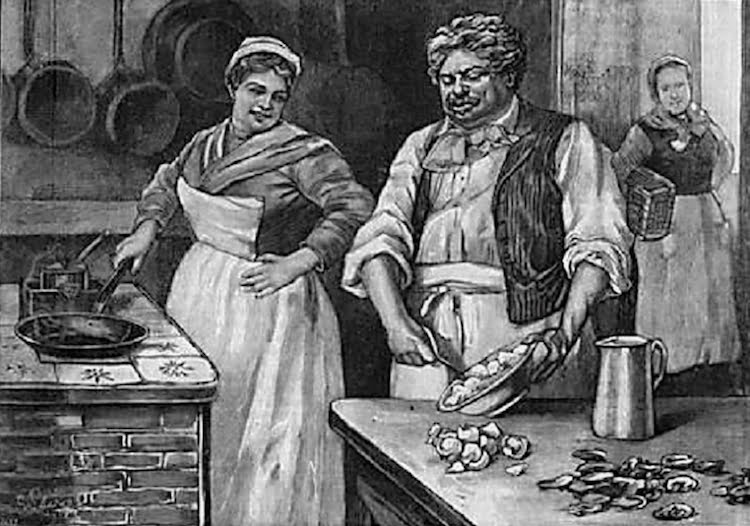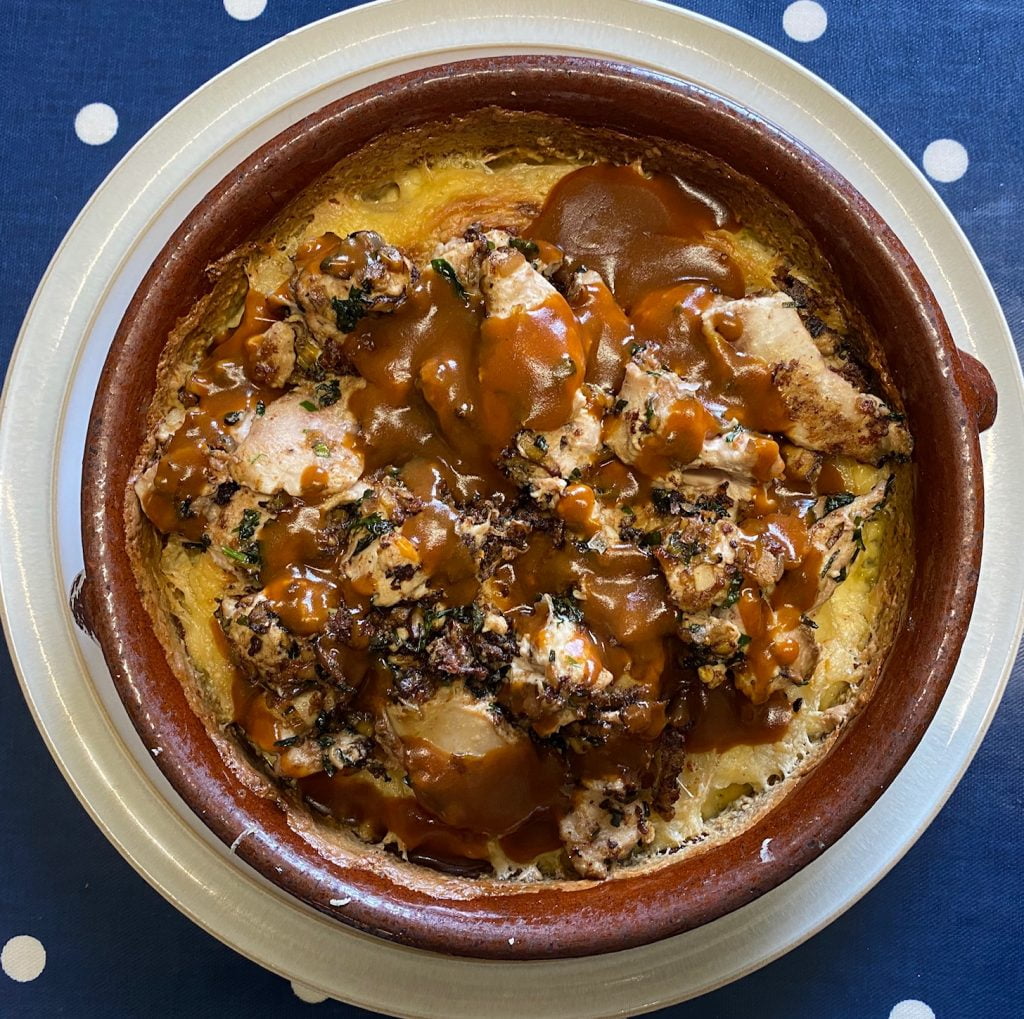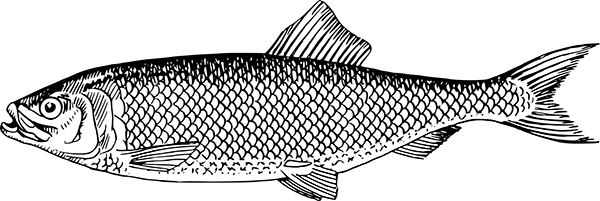Dumas and his Grand Dictionary of Cuisine, a flawed translation corrected and all its herring jokes and recipes restored
DUMAS ON HERRING
Alexandre Dumas (1802 – 1870) may, in fact, be better known for The Three Musketeers (1844) and The Count of Monte Christo (1844-46) than for his herring recipes – or that labour of love, Le Grand Dictionnaire de Cuisine (1873) in which they posthumously appeared. But both they and it are worth celebrating.

The English playwright Watts Phillips described Dumas as, The most generous, large-hearted being in the world. He was also the most delightfully amusing and egotistical creature on the face of the earth. His tongue was like a windmill – once set in motion, you never knew when he would stop, especially if the theme was himself. Phillips is best known, because Dickens accused him of plagiarism, when, in fact, things seem to have been the other way round. Throughout the text of Le Grand Dictionnaire,Phillips’ description of Dumas also rings true.
It may not always be accurate, but it is large-hearted.
It’s ‘Grand’ because it runs to 1,150 pages. He was a good cook, loved cooking and was fascinated by the stories that surround food. In 1869, taking all his books and the research he’d amassed, he decamped to his place in Roscoff and set about writing what he considered would be his magnum opus. As a writer, he wasn’t one to hang about and he sent the manuscript off to his publisher early in 1870. Sadly, the Franco-Prussian War and the events of the Paris Commune intervened. Dumas, who died in the December of that year, never saw it in print.
For the English edition, the ‘Grand’ was dropped, but, then, it’s only 281 pages long. There were also quite a few strange editorial decisions.
The English Edition
Edited, Abridged, Translated by Louis Colman, the English edition says, The art of smoking herring was invented by a Dutch fisherman named Beukels or Bruckalz, who died in 1449. Dumas, on the other hand, only wrote, C’est un nommé Bruckalz qui a inventé l’art de fumer les harengs.
The semi-legendary figure of Beukels, Beukelz, Beukel, Beuckel, Beuckels, Beuckelsz, Benkel, Beukelszoon, Beukelzon, Beukelsen, Beuckelsen, Benkelen or even Bruckalz (the herripedia goes for Beuckel) did not invent herring smoking. His date of birth and death are disputed, along with his whole existence, but his claim to fame was the celebrated Dutch method of gutting and salting. In 1556 the retiring Holy Roman Emperor Charles V visited his supposed tomb in Biervliet.
As helpful editorial contributions go, Louis Colman’s is, as they say, neither fish, flesh, nor good red herring. It would have been so easy, simply to forgive Dumas. Yes, he had a cavalier approach to history, but it was frequently better than the real thing.
Colman doesn’t stop there. He deletes the specific Irish smokehouse recommendation and bizarrely changes the day of the Procession of the Herrings tradition (see the herripedia’s P for Procession of the Herrings) from Holy Wednesday to Maundy Thursday. Maybe he thought nobody in England would know when Holy Wednesday was, whereas everybody knows the monarch distributes Maundy Pence on the Thursday of Holy Week.
Where Dumas specifies boiled ‘farineuse’ potatoes the translation specifies ‘flaky boiled potatoes’, whatever they are. There are several other divergences and omissions. The text below is largely a retranslation. It restores three lost recipes (Soft Herring Roes in the Pan, Salt Herring Hors d’Oeuvres and Smoked Herring) and a joke about a Gascon.
Having spent good times in St Pierre d’Aurillac with Pierre Scheidt and the Gascon fife and drum band Les Sous-Fifres de St Pierre, the herripedia is sensitive to stereotyping. The community holds an annual Fête du Vin et de l’Alose (festival of wine and shad) and they bottle shad by the shelf-load. And shad is a relative of the herring, once thought to lead the herring shoals.
But then Dumas was sensitive too. Dumas, actually his first name, was taken from his grandmother, a Haitian slave. Like his father, he chose to use it as his surname. And the character D’Artagnan was a Gascon, heroically drawing on a stereotype of hot-headed boastfulness. Let’s just say Gascons are like D’Artagnan, except they might not all be the best swordsman in France.
Le Grand Dictionnaire de Cuisine: Herring
Everyone knows the herring. I would even say there are few who dislike it. In life, its back is green, its sides and belly white; dead, the green of its back turns blue. It is a child of The Pole. From its place of birth to the forty-fifth latitude, it can be found in every sea, from the twenty-fifth of June making what the Dutch call the herring lightning;shoals that are several leagues in length and breadth; so thick in the shallows they stifle each other in their thousands. Sometimes the nets they fill, not strong enough to lift the weight of them, tear and release the catch only half taken. Like the pillar of fire and smoke of the Hebrews, their migration may be followed day and night – at night by the phosphorescent glow they cast, in the day by the flocks of gulls which follow them, plunging every now and then and rising with a flash of silver in the beak. Whales, sharks, porpoises, tuna and sea bream follow them, catching fish from the shoal and consuming them in enormous quantities.
According to Victor Meunier, Bloch has stated that from a single Swedish port, more than seven million are taken annually; but the fecundity of this fish compensates for all the destruction of its progeny. Sixty-six thousand, six hundred and six eggs have been counted in a single female. On top of that, there are seven females for every two males.
While the cod fisheries have declined, the herring fisheries have become the most important of all. Le Havre, which once sent out up to forty cod fishing boats, this year sent only one. Eight hundred thousand people make their living in this industry; in Europe it’s said to be worth close to four million francs.
It was a man called Bruckalz who invented the art of smoking herrings.
The finest of the fresh herring to be had in Paris come from the Normandy coast; we describe below the ways in which they can be prepared.
Freshly salted herring should always come from Rotterdam or Enkhuizen, in Holland. It is cut into slices and eaten raw, with no more preparation than that of a salad. The finest smoked herring, the largest, fleshiest, most golden and best juniper-smoked are those of the Germuth smokehouses in Ireland.
Salt herring almost never appears on the tables of the rich, but in the lands where it abounds, it is of the utmost utility to workers and the poor. In some parts a very pleasant and appetizing fricassee is made of herring cut into small pieces and, without desalting, fried in lard with plenty of chopped, raw leeks, mixed with potatoes of a large and floury variety, previously boiled, along with a few sprigs of rosemary, in well-salted water.
Fresh herring is an excellent fish, which people would make considerably more fuss about if it were rare and expensive. Look for ones with red gills, shiny scales and well-rounded bellies: these ones are full. Herring is rarely eaten at its best, however, until the end of August or mid-September.
A bizarre custom involving the canons of Reims Cathedral survived until the sixteenth century. On Holy Wednesday, after Tenebrae, they would process to the Church of St Remy in twos, each dragging a herring on a string. Each canon was trying to step on the herring of the one in front of him, while saving his own from the one behind. It was only possible to put an end to this extravagant custom by banning the procession.
As everyone knows, herring fisheries are one of England’s most productive financially industries. Great quantities are exported to Italy for Holy Week. When Rome had fallen to the revolutionary French army and Pope Pius VI had been obliged to leave, in London a member of the parliamentary committee responsible for the herring industry observed, with the Pope chased out of Rome, Italy would presumably turn Protestant. “May God preserve us!” cried another. “Why,” said the first, “would it upset you to see the number of good Protestants increase?” “No,” came the reply, “it’s not that, but if there were no more Catholics, what would we do with our herring?”
There was this Gascon. He said, “If he were governor of a besieged town, I’d hold out against even the cruellest pangs of hunger.” “I believe you, Sir,” his valet replied, “seeing how long you spend with nothing more than a smoked herring on your plate.”

Fresh Herring with Mustard Sauce
Take 12 herrings. Remove the guts through the gills, scale, wipe and place in an earthenware dish, marinating them in oil with salt and sprigs of parsley. A quarter of an hour before serving, grill on both sides. Once they’re cooked, place them on your dish and serve with a white butter sauce into which you have blended 1 tablespoon of fresh mustard. Other sauces grasses can be used. Served cold, you may use any oil-based dressing you consider appropriate.
Fresh Herring with Fennel
Split your herring down the back and brush with melted butter and salt. Wrap in fennel and grill and serve with a roux-based sauce into which you have blended finely chopped fennel leaves and stalks blanched in white wine.
Soft Herring Roes in the Pan
Take the milt or soft roes from around thirty herrings, blanch and drain them; place a knob of butter in a saucepan, with mushrooms, parsley, shallots and scallions, all finely chopped; salt, pepper and Spice Parisienne; simmer gently, then add the soft roes, letting them cook briefly in the mixture; you will have prepared a round or a square pan with a gratin at the bottom – fat or lean – about the width of half a finger deep, drizzle with oil and put it in the oven until the gratin is cooked; just before serving, add the soft roe mixture, degrease, dress with a reduced espagnole sauce, into which you have squeezed the juice of one lemon, and serve.
[Note: Spice Parisienne or épices fines is a spice mix variously using white pepper, cinnamon, paprika, nutmeg, mace, cloves, coriander, ginger, bay and basil – a little pinch of each works well. Meanwhile, where I say ‘put it in the oven,’ Dumas says ‘oil the top and sides of your pan, put it on the grill and place the grill in the hot ashes.’ Take your pick.]
Fresh Herring Matelot
Put your herring in a saucepan with butter, parsley, mushrooms, scallions, a clove of garlic, 2 good glasses of Burgundy or Bordeaux, salt and pepper. Cook on a high flame, serve with its own sauce and garnish with fried croutons.
Salt Herring Hors d’Oeuvres
Clean a dozen herrings, remove their heads, tails and fins, skin them and place them on the stove in a pan of milk and water. When they’re just cooked, drain and plate with slices of raw onion and Reinette apples. Serve with a marinade or a well-beaten vinaigrette and watercress.
[Note: In the UK, Cox’s Orange Pippins or similar would be a suitable substitute for Reinette apples.]
Smoked Herrings
Take five or six of these herrings and wipe them. Remove heads and tails. Cut them, head to tail along the backbone and open their backs. Place them on an earthenware dish, sprinkle with oil and let them marinate for a moment before grilling for five minutes, turning once. Plate and serve.
[Note: the meaning of hareng saur, which Dumas specifies, has changed. It tends, these days to refer to something like a kipper, but he’s clearly describing something closer to a modern Yarmouth bloater, probably even the more highly salted and smoked red herring – in the next recipe he talks of desalting the ‘hareng saur’. It’s a simple recipe, however, and can be adapted to the kipper if necessary.]
Smoked Herring à la Sainte-Menehould
Desalt in cream. Cook for 20 minutes in a Sainte-Menehould you have prepared as follows. In a saucepan mix an ounce of butter with flour and milk, parsley, scallions, garlic, thyme, bay leaf, basil, a little pepper. Add your herring and cook. Remove and dip them in melted butter, then cook in a country oven until they take on a good colour. Serve on an olive oil remoulade.
Preparation of Smoked Herring for Good Use Later
Desalt in milk and then grill good Irish herrings; let them cool and remove the fillets to use later in sandwiches or served on toast with fresh butter; to serve as an hors d’oeuvre, dressed with fine oil and the juice of bitter oranges; to place on a bed of buttered noodles or lasagne, or of mashed potatoes, chestnuts, sweet potatoes or creamed white beans; to make a hash for an omelette or to serve scrambled eggs, adding chopped picholine olives, semi-salted cream cheese, and a little walnut cordial; it makes for tasty and distinctive starters.
Thanks
My good friend Simon Tepper first alerted me to Dumas’ herring recipes, which he’d come across in his neighbour’s copy of Dictionary of Cuisine. It was only when I couldn’t find the photographed pages he’d sent that I went to online French texts. When I eventually found the photographs, I began to notice the discrepancies between the two. I ended up spending far longer on this entry than I originally meant to, but it’s been great to discover Alexandre Dumas as a kind of herripedia forerunner. So big thanks to Simon and his neighbour Jack Homer.
See also
- AQUINAS, ST THOMAS
- BATTLE OF THE HERRINGS (1429)
- BEUCKEL, Willem
- BLOATER
- BRITISH FISHERY
- DIVINE PROVIDENCE
- DUTCH GRAND FISHERY
- FASTING
- HARENG SAUR
- HARENG SAUR MONOLOGUES
- HERRING UNDER A FUR COAT
- JANSSON’S TEMPTATION
- JEWISH RECIPES
- KIPPER
- LOCKMAN, JOHN
- MARTYRED SAINT
- NASHES LENTEN STUFFE
- NEUCRANTZ: ON HERRING (1654)
- OLIVIER, LAURENCE
- PROCESSION OF THE HERRINGS
- PROPHETIC HERRINGS
- RACIAL THEORY
- RECIPES FROM THE HERRING BOARD
- RED HERRING
- ROLLMOPS & BISMARCKS
- SHOALS
- SWIFT, JONATHAN
- WHITE HERRING
